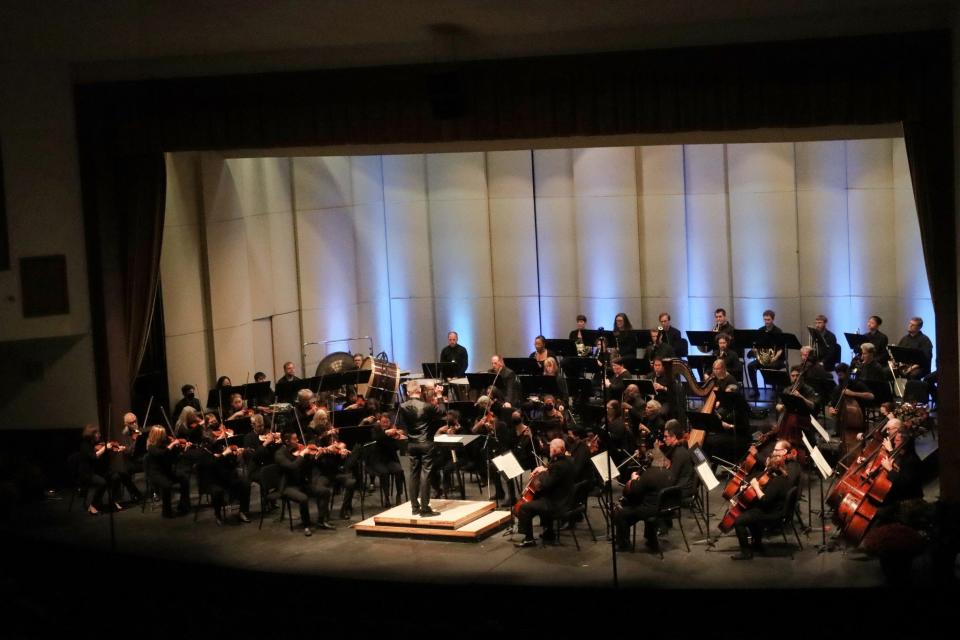Stravinsky, Mozart to be featured in Adrian Symphony Orchestra's March 15 concert
- Oops!Something went wrong.Please try again later.
- Oops!Something went wrong.Please try again later.
ADRIAN — Stravinsky’s first foray into neoclassicism, Mozart’s final symphony, and a folk-based piece by a 20th-century American composer make up the program for the next installment of the Adrian Symphony Orchestra’s season.
The concert, titled “Pulcinella” after the Stravinsky suite that’s part of the program, is at 7:30 p.m. Friday, March 15, at Adrian College’s Dawson Auditorium.
Tickets are $37/$31/$23 for adults, $35/$29/$23 for senior citizens, and $19/$16/$12 for students, and are available at adriansymphony.org, by calling the ASO at 517-264-3121, or at the door beginning two hours before concert time.
ASO Music Director Bruce Anthony Kiesling will discuss the music on Friday’s program at a Classical Conversation beginning at 6:40 p.m. in the auditorium. The talk is free to all concertgoers. Additionally, a cash bar opens in the Dawson lobby beginning at 6:30 p.m.

All three of the works — Ruth Crawford Seeger’s “Rissolty Rossolty,” Stravinsky’s “Pulcinella Suite,” and Mozart’s 41st Symphony, known as the “Jupiter” Symphony — are written for smaller orchestral forces overall than are part of the rest of the ASO’s season.
And, unlike the season’s other classical-music concerts, there is no guest artist this time.
“This one is designed to showcase the orchestra itself,” Kiesling said.
“Rissolty Rossolty” fits into the ASO’s multiyear plan to open more concerts with works by women composers.
Seeger, who studied at the American Conservatory of Music in Chicago, began her composing career in the modernist style that was becoming popular at the time.
But she later became interested in American folk music, and eventually studied with (and later married) composer Charles Seeger — the father of Pete Seeger, who became well-known as a folk singer. She wrote this particular piece in 1941 on a commission from CBS for Alan Lomax’s folk music radio program.
Kiesling knew of her pioneering work in the world of electronic music. When he first heard “Rissolty Rossolty,” however, “it was nothing like what I expected.”
The piece is a blend of three bluegrass tunes including “Risseldy, Rosseldy,” from which her composition’s name comes.
“It’s nothing like any of her other pieces,” Kiesling said, because of its folk influences, and a listener might well be reminded of some of Aaron Copland’s music in its “Americana” feel.
The “Pulcinella Suite” is this concert’s installment in what the ASO is calling its “Season of Stravinsky,” a season which kicked off in October 2023 with that composer’s “Firebird Suite,” continued in November with “Petrouchka,” and wraps up this May with “Rite of Spring.”
The suite, which premiered in 1922, was based on a ballet score Stravinsky wrote a couple of years earlier as part of his collaboration with the ballet impresario Sergei Diaghilev, a collaboration which had already led to the ballets “The Firebird,” “Petrushka” and “The Rite of Spring.”
Diaghilev had come across some music that was thought to have been written by the Baroque-era composer Giovanni Batista Pergolesi and commissioned Stravinsky to write a ballet using it. As it later turned out, Pergolesi had nothing to do with this particular music. But using it as the basis for a ballet marked a shift for Stravinsky into neoclassicism.
“It’s buoyant and it sparkles,” Kiesling said of this particular piece. “It reminds me of Haydn. It’s bright and shimmery, but it has touches of a modern edge.”
Subscribe Now: For all the latest local developments, breaking news and high school sports content.
And because of its neoclassical style and Stravinsky’s own interest in Mozart, Kiesling thought that the “Jupiter” Symphony would be a great pairing with “Pulcinella” on this program.
The symphony, Mozart’s last, was written in the summer of 1788 as the culmination of a frantic compositional period that also included the 39th and 40th symphonies. Together, the three works are Mozart’s greatest symphonies.
Although it’s not known for certain when the 41st actually premiered, in fact Mozart most likely never heard it performed at all.
By any measure, it has a rightful place as one of the greatest symphonies in the repertoire, especially on the strength of its enormous last movement.
“It’s this giant fugue with five different subjects that are all designed to interact at the same time,” Kiesling said. “Listening to it, it has this overwhelming power.”
Mozart himself did not give the symphony its nickname; that was done long after his death, probably by the impresario Johann Peter Salomon for a performance in London. On the strength of its musical and emotional heft, Salomon likely thought that naming the work after the chief Roman god was entirely fitting.
If you go
WHAT: “Pulcinella,” featuring Seeger’s “Rissolty Rossolty,” Stravinsky’s “Pulcinella Suite,” and Mozart’s “Jupiter” Symphony
WHEN: 7:30 p.m. Friday, March 15. A Classical Conversation about the music begins at 6:40 p.m.
WHERE: Dawson Auditorium Adrian College
TICKETS: $37/$31/$23 for adults, $35/$29/$23 for senior citizens, $19/$16/$12 for students
HOW TO ORDER: Online at adriansymphony.org, by calling the ASO at 517-264-3121, or at the door beginning two hours before the concert
This article originally appeared on The Daily Telegram: Preview: Adrian Symphony Orchestra March 15 concert

